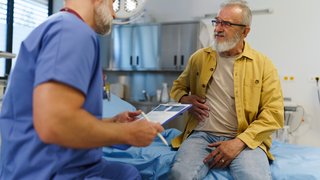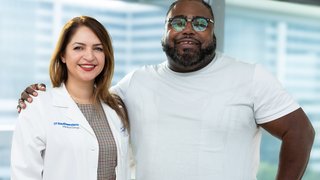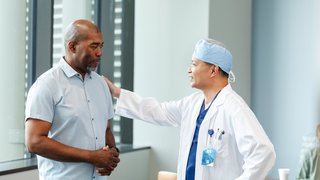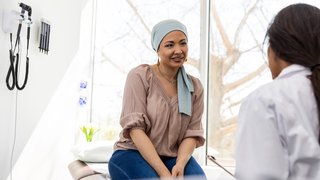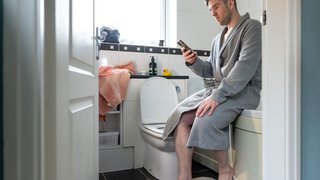Increasing access to cancer clinical trials across Texas
September 19, 2024

Clinical trials offer some of the most promising new treatments for patients with a cancer diagnosis. However, many patients don’t get a chance to receive these life-saving therapies.
Trials may call for extra medical appointments that can be hard for people who can’t afford to take time off work or arrange for child care. They sometimes involve extra travel, which can quickly become expensive if you don’t live near where you are receiving treatment. Even after patients are accepted into a clinical trial, which itself can be a challenging process, navigating the system can be daunting.
Minority groups are often disproportionately affected by these barriers. Fewer than 5% of patients with cancer enroll in clinical trials, and the vast majority of these patients are Caucasian. While Black and Latino/Hispanic people represent 12% and 16% of the U.S. population with cancer, respectively, clinical trials are made up of only 6% Latino/Hispanic patients and 10% Black patients.
UT Southwestern is dedicated to improving clinical trial access. To do this, the Harold C. Simmons Comprehensive Cancer Center has earned four grants aimed at making clinical trials more accessible for underserved communities. With these grants, we are providing resources to reduce barriers to enrollment, including:
- Transportation challenges
- Difficulty navigating the medical system
- Misperceptions about clinical trials
- Lack of available trials at many health care centers sites
By increasing access and awareness to clinical studies, more people will ultimately receive new therapies – and clinical trials will become more representative of the populations we serve.
"As a provider who often works with patients on clinical trials, I believe in my heart of hearts that clinical trials allow me to give my patients the best possible care.”
David Gerber, M.D.
How does a clinical trial work?
Before a medication or treatment is approved by the U.S. Food and Drug Administration (FDA), it must go through extensive testing to make sure it's safe and effective.
Clinical trials typically are developed by pharmaceutical companies, federal agencies such as the National Institutes of Health (NIH), or individual clinicians and researchers at institutions such as UT Southwestern. Trials are categorized according to their phase:

- Phase I trials: Assess the safety of a new treatment with a small number of participants (15-30) to determine safe dosage levels and to identify any side effects.
- Phase II trials: Determine whether the treatment is effective, generally in a larger pool of participants (50-100).
- Phase III trials: Continue to test the efficacy of the treatment by comparing it to current therapies in a larger group of patients (100-1,000).
- Phase IV trials: Provide ongoing monitoring after a therapy is FDA-approved, typically in thousands of patients.
Before new treatments are approved, they are often studied in randomized, double-blind, placebo-controlled trials. In these studies, usually all patients receive the current standard therapy for a medical condition. Some participants also get the new, experimental therapy with it, while others receive a placebo, which acts as a control for comparison. To avoid biasing the trial results, neither the patient nor their health care providers know which treatment is being given, even after the trial ends.
In clinical trials, patients are monitored closely. They can choose to stop participating at any time. Sometimes, if a trial therapy is found to be highly effective, researchers may stop the study early and offer the therapy to all participants so everyone can benefit.
Related reading: Cancer Clinical Trials 101
How grant funding helps break down obstacles to enrollment
Through four grants awarded to UT Southwestern, we’re eliminating the most common obstacles to entry for cancer clinical trials: financial barriers, clinical trial criteria, and difficulty navigating the medical system.
Financial barriers
Participating in the average clinical trial may result in as much as $600 [AS1] per month in nonmedical costs, such as traveling to appointments and having to miss days of work. Perhaps not surprisingly, people with annual household incomes under $50,000 are 30% less likely to enroll in cancer clinical trials than are wealthier individuals. Poorer individuals may also have to travel farther to get to a clinical trial.
Covered costs
* Transportation
* Child care
* Lodging
* Meals
* Help with bills, such as internet for telehealth visits
One of our new grants helps reduce these barriers. The Cancer Prevention and Research Institute of Texas (CPRIT) Clinical Trial Participation Award (RP210115) offers patients the money needed to cover nonmedical costs.
Where a trial is being held can also limit which patients are eligible to enroll. For patients managing cancer, even an additional hour roundtrip for care can be financially or logistically difficult.
To provide the option of clinical trials to more patients, a separate grant called the CPRIT Clinical Trials Network Award (RP220542) expands access to clinical trials in Texas. With this funding, we have brought cancer clinical trials to health care systems throughout the state, including in Fort Worth, Temple, and West Texas. This means many communities have clinical trial options for the first time.
Financial difficulties disproportionately affect communities of color, with national data showing Black, Native American, and Latino workers have a lower median income compared with their Caucasian counterparts. Meanwhile, about 20% of new medications work differently based on a patient’s genetics and ethnicity. We therefore cannot assume that medications will work the same in all people. Efficacy and side effects may differ for IV medications, pills, and even topical treatments like creams and ointments.
By improving cancer clinical trial access for underrepresented groups, these CPRIT grants also help ensure that new medications are tested across diverse populations.
Clinical trial availability
Some clinical trials include extra procedures and tests, which allow researchers to learn more about the efficacy and toxicity of new treatments. Not all clinics and practices may be able to perform these sometimes complex or unusual requirements. If a health care system cannot conduct a clinical trial, people who get care there will not have access to the trial. Safety-net health care systems, which are committed to caring for under- or uninsured individuals, may face extra challenges in conducting complex trials.
To offer the benefits of clinical trials to more patients, our Stand Up to Cancer Diversity in Early Clinical Trials Research Grant allows patients treated in one health care system to participate in trials conducted at another center. Specifically, under- or uninsured individuals with who receive cancer care at Parkland Health, the integrated safety-net healthcare system for Dallas County, have the opportunity to enroll in Phase I and Phase II cancer clinical trials at UT Southwestern and Parkland Health. As with our other grants, we believe that this program will ultimately help increase the diversity and representativeness of clinical trial populations, thereby making trial results more relevant to more people.
Difficulty navigating the medical system
Navigating cancer treatment is complex – layering on extra visits and paperwork to participate in a clinical trial can feel overwhelming and might discourage patients from joining. Specialized programs such as our Stand Up to Cancer Diversity in Early Clinical Trials Research Grant may add even more challenges.
Through the American Cancer Society Navigation Award, we are making it easier for patients to know what to expect if they enroll in a cancer clinical trial. We are also helping patients get to their appointments and complete their tests if they do enroll. This grant funds the services of clinical trial navigation, which helps patients find and participate in clinical trials and understand a trial’s requirements and provides support throughout the study to keep them informed.
UT Southwestern already has a robust cancer navigation program, and this grant expands the service to all Simmons Cancer Center clinical trial sites across the metroplex, including at Parkland Health and Richardson/Plano.
Greater access to cancer clinical trials in Texas
Overcoming hurdles to clinical trial access is not just about making treatments available – it's also about offering hope and opportunity to every patient. By improving access to clinical trials, we aim to help develop crucial new therapies.
With these new grants, we hope to reduce the financial, socioeconomic, and systemic barriers to trial enrollment. The grants fuel our commitment to making clinical trials accessible for all, ensuring that every eligible patient, no matter their background or financial situation, has the chance to benefit from and contribute to groundbreaking research. By clearing these obstacles, we’re moving cancer research forward one opportunity at a time.
To find out whether you or a loved one with cancer might be eligible for a clinical trial, call 214-645-8300 or request an appointment online.




